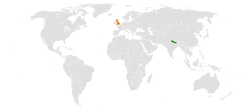 | |
Nepal | United Kingdom |
|---|---|
Nepalese-British relations are the foreign relations between the Federal Democratic Republic of Nepal and the United Kingdom of Great Britain and Northern Ireland. Relations between the UK and Nepal have historically been friendly and there have been close links between the two royal families, until monarchy was abolished in Nepal. The UK is highly regarded in Nepal as a result of historical ties, development assistance and long-term support in the struggle for democracy in Nepal.